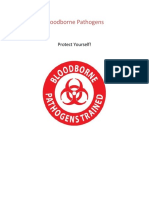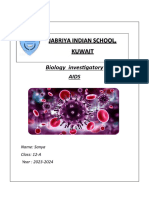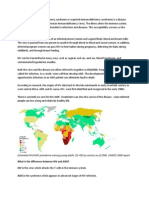Hiv Aids
Hiv Aids
Uploaded by
Denn Bryce DimaandalCopyright:
Available Formats
Hiv Aids
Hiv Aids
Uploaded by
Denn Bryce DimaandalOriginal Title
Copyright
Available Formats
Share this document
Did you find this document useful?
Is this content inappropriate?
Copyright:
Available Formats
Hiv Aids
Hiv Aids
Uploaded by
Denn Bryce DimaandalCopyright:
Available Formats
HIV/ AIDS
What is HIV?
HIV stands for human immunodeficiency virus, which is the virus that causes acquired immune deficiency syndrome (AIDS). HIV gradually destroys the body's ability to fight infections and certain cancers. People diagnosed with AIDS may get what are called opportunistic infections life-threatening diseases caused by viruses or bacteria that healthy people are usually able to fight off.
How can HIV affect pregnancy and the baby's health?
Higher rates of ectopic pregnancy have been reported in HIV- positive women than in uninfected women, which may be related to the effects of other concurrent transmitted diseases. Bacterial pneumonia, UTIs and other infections are more common during pregnancy in HIV positive women. Preterm labour may be more common in HIVpositive women, with rates as high as double than rates seen in uninfected women.
There is little difference in the birth weight of babies born to HIV positive mothers. Increased stillbirth rates have been reported, especially from areas where epidemic has been present for a long time. You can pass the virus to your baby during pregnancy, birth, or breastfeeding. Without treatment, your baby has a 25 percent chance of becoming infected. However, you can reduce your baby's risk to less than 2 percent if you get appropriate treatment for yourself during your pregnancy.
The HIV virus can be transmitted through:
Exposure to blood and other body secretions through sexual contact. Sharing contaminated needles for injection. Transfusion of contaminated blood or blood products. Perinatally from mother to fetus or newborn. Breastfeeding.
What are the signs and symptoms?
Many people have no symptoms when they first become infected with HIV. Others develop temporary flu-like symptoms such as fever, headache, sore throat, achiness, fatigue, and swollen glands in 1 - 6 weeks This illness is temporary and is known as a 'primary HIV infection' . It can take years after infection for more severe symptoms to develop. These may include swollen glands, fatigue, weight loss, frequent fevers and sweating, persistent or frequent yeast infections in your mouth or
If a person with HIV is not given any medical treatments, the virus may progress onto AIDS, usually within 8 to 10 years (called 'seroconversion'). A person who has AIDS usually experiences being unwell with minor infections and illnesses as their immune system becomes depleted. During this time most people experience a gradual decline in the number of CD4+ cells in their blood. These cells are the immune system's key infection fighters. Healthy adults have 1,000 or more of these cells in every cubic meter of blood. Once you have fewer than 200 or develop one of 26 other conditions, you are
How is HIV managed during pregnancy?
Getting appropriate care It's important to find a caregiver who has experience caring for pregnant women with HIV or to look for a special perinatal clinic for HIV-positive women, which may offer a team of doctors, midwives, and other providers to care for you.
Testing you'll need Your practitioner will do blood tests throughout your pregnancy to test your viral load (the amount of the virus in your blood) and CD4+ cell count (the number of CD4+ immune cells you have). The results of these tests will help determine when to start drugs to suppress HIV (this is called antiretroviral therapy), what type of therapy is best for you, and whether the regime you're on is working or needs to be altered.
Determining treatment Your treatment will depend on your test results, your clinical condition, how far along your pregnancy is, and whether you're already taking antiretroviral medications. Your caregiver will consider what's known about any potential effects a medication may have on your baby. Deciding which drugs to use to treat HIV-infected people is especially complicated during pregnancy because there are two patients the mother and her baby.
Getting good prenatal care Depending on which medications you're taking, you may have periodic ultrasounds to check on your baby's growth as well as tests such as biophysical profile and non stress tests to assess your baby's well-being, beginning in the third trimester. Taking care of yourself And be sure to follow safer sex practices. Having unprotected sex may infect your partner and puts you at risk for contracting another STI, which can be risky for you and your baby.
Interventions to prevent Mother to Child transmission of HIV
Reduction in the frequency of unprotected sexual intercourse during pregnancy. Lifestyle changes, avoidance of drug use and smoking in pregnancy. Antiretroviral therapy: zidovudine or combination Vitamin A and other micronutrients Immunotherapy Birth Canal cleansing Caesarean section delivery
You might also like
- Research ProposalDocument5 pagesResearch ProposalAishwarya Bharath100% (2)
- Ayurvedic Constitution Test: Vata Pitta KaphaDocument2 pagesAyurvedic Constitution Test: Vata Pitta KaphaSalwa Nursyahida100% (2)
- Employees Rights & ResponsibilitiesDocument25 pagesEmployees Rights & ResponsibilitiesRanjith Prakash100% (1)
- Hiv/Aids: Preventing Testing TreatingDocument8 pagesHiv/Aids: Preventing Testing TreatingReza Badruun Syahrul HakimNo ratings yet
- HIV and AIDS NOTESDocument9 pagesHIV and AIDS NOTESGoogle JungubawaNo ratings yet
- Contemporary Issues in Public Health - Diya Deborah AdebowaleDocument6 pagesContemporary Issues in Public Health - Diya Deborah AdebowaleDeborah BanjoNo ratings yet
- INTRODUCTION Thesis CorrtnDocument23 pagesINTRODUCTION Thesis CorrtnNolwandhle Matsiliso50% (2)
- Hiv Immunology Study CaseDocument7 pagesHiv Immunology Study Casetan choonNo ratings yet
- HIVAIDSDocument66 pagesHIVAIDSomarmamluky254No ratings yet
- What Are HIV & AIDS?Document7 pagesWhat Are HIV & AIDS?majip5631No ratings yet
- What Is HIV?Document7 pagesWhat Is HIV?Mark Augustus ConsolacionNo ratings yet
- What Is Hiv ProjectDocument10 pagesWhat Is Hiv ProjectScience,Physical Education And Sports VideosNo ratings yet
- HIV AIDS: The Causes, Symptoms, Effects and TreatmentDocument3 pagesHIV AIDS: The Causes, Symptoms, Effects and TreatmentTengku Nurhydayatul Tengku AriffinNo ratings yet
- HIV AIDS CausesDocument9 pagesHIV AIDS Causescamelapedro574No ratings yet
- HIV Puterisalma A5 1810105056Document4 pagesHIV Puterisalma A5 1810105056Salma Puteri PermatasariNo ratings yet
- III What Does"Aids"Mean?Document7 pagesIII What Does"Aids"Mean?Jhayson_Suarez_992No ratings yet
- English Hiv LeafletDocument2 pagesEnglish Hiv LeafletVega HapsariNo ratings yet
- Hiv InfectionDocument3 pagesHiv Infectionupasana.b.1012No ratings yet
- Bloodborne PathogensDocument11 pagesBloodborne PathogensChris-Goldie LorezoNo ratings yet
- Bloodborne Pathogens PDFDocument11 pagesBloodborne Pathogens PDFAqib SatarNo ratings yet
- Screenshot 2023-09-05 at 9.24.20 PMDocument17 pagesScreenshot 2023-09-05 at 9.24.20 PMThanvi EraparajuNo ratings yet
- What Is AIDS?: Acquired Immunodeficiency Syndrome (AIDS) Is A Collection of Diseases ResultingDocument5 pagesWhat Is AIDS?: Acquired Immunodeficiency Syndrome (AIDS) Is A Collection of Diseases ResultingVigneshwaran RavishankarNo ratings yet
- Stage 1: Acute HIV InfectionDocument16 pagesStage 1: Acute HIV Infectionsalsa bilaNo ratings yet
- By: Axel Jusuf (1461050177)Document9 pagesBy: Axel Jusuf (1461050177)AxelJusufNo ratings yet
- HIV in PregnancyDocument26 pagesHIV in Pregnancyairahibrahim23No ratings yet
- HIV and Its TreatmentDocument24 pagesHIV and Its Treatmentaathira_kNo ratings yet
- AIDSDocument2 pagesAIDSChristelle ParolmaNo ratings yet
- Hiv AidsDocument239 pagesHiv AidsChristine Cincollagas100% (1)
- Dela Rama - Presentation Planning FormDocument6 pagesDela Rama - Presentation Planning FormJriejdi IdienNo ratings yet
- NSTP 1 HIVDocument10 pagesNSTP 1 HIVcedhspareaccNo ratings yet
- Hiv/Aids: Sexually Transmitted Infection (Stis)Document2 pagesHiv/Aids: Sexually Transmitted Infection (Stis)AlthonyLimNo ratings yet
- HIV Infection and AIDS: An Overview: U.S. Department of Health and Human Services Contact Us - en EspañolDocument9 pagesHIV Infection and AIDS: An Overview: U.S. Department of Health and Human Services Contact Us - en EspañolLorraine AtienzaNo ratings yet
- Estimated HIV/AIDS Prevalence Among Young Adults (15-49) by Country As of 2008. UNAIDS 2008 ReportDocument16 pagesEstimated HIV/AIDS Prevalence Among Young Adults (15-49) by Country As of 2008. UNAIDS 2008 Reportlianghoo94No ratings yet
- Name-Animesh Sharma Class-9A Roll-3Document11 pagesName-Animesh Sharma Class-9A Roll-3animeshsharma2092006No ratings yet
- STDs HIVsAIDsDocument26 pagesSTDs HIVsAIDsMarco AvenillaNo ratings yet
- Biology Project: Topic:-Acquired Immune Deficiency Syndrome Done By: - CH - Shawn Heli Class: - 12-B Roll - No: - 09Document7 pagesBiology Project: Topic:-Acquired Immune Deficiency Syndrome Done By: - CH - Shawn Heli Class: - 12-B Roll - No: - 09Shawn HeliNo ratings yet
- Definition of AIDS and HIV InfectionDocument7 pagesDefinition of AIDS and HIV InfectionLily SharmaNo ratings yet
- The Difference Between HIV and AidsDocument14 pagesThe Difference Between HIV and AidsAnonymous bq4KY0mcWGNo ratings yet
- Hiv and Aids (Ref)Document19 pagesHiv and Aids (Ref)bacangsunseyNo ratings yet
- FwfafafwDocument4 pagesFwfafafwmarvinvatilloNo ratings yet
- What Is HIV? ExpandedDocument4 pagesWhat Is HIV? ExpandedAlyannaBesares100% (1)
- Hiv WhoDocument6 pagesHiv WhoFeiruzNo ratings yet
- What Is AIDS?Document7 pagesWhat Is AIDS?Bhavya PNo ratings yet
- HIV and PregnancyDocument2 pagesHIV and PregnancyMagdalena Dwiyani HutajuluNo ratings yet
- Artikel B. InggrisDocument9 pagesArtikel B. Inggrisbb dias0% (1)
- HIV and Pregnancy: Fact SheetsDocument11 pagesHIV and Pregnancy: Fact Sheetsessie79No ratings yet
- What Is Aids?Document47 pagesWhat Is Aids?Mohsin SaqlainiNo ratings yet
- Aidsfacts: Minnesota Aids Project AidslineDocument2 pagesAidsfacts: Minnesota Aids Project AidslineJerilee SoCute WattsNo ratings yet
- High-Risk Prenatal Client - Hiv - AidsDocument20 pagesHigh-Risk Prenatal Client - Hiv - AidsMichael Angelo SeñaNo ratings yet
- HIV Counseling and Testing: Facts, Issues, and Answers: ContentsDocument10 pagesHIV Counseling and Testing: Facts, Issues, and Answers: ContentsdenosciNo ratings yet
- Health & Diseases: Topic: AIDSDocument19 pagesHealth & Diseases: Topic: AIDSkakaramNo ratings yet
- The Complete Guide to HIV: Symptoms, Risks, Diagnosis & TreatmentsFrom EverandThe Complete Guide to HIV: Symptoms, Risks, Diagnosis & TreatmentsNo ratings yet
- Documentation IN: Nursing Competency AppraisalDocument6 pagesDocumentation IN: Nursing Competency AppraisalPat PalomarNo ratings yet
- Hiv NSDocument17 pagesHiv NSdarraNo ratings yet
- How Can I Tell If I Have HIV?Document61 pagesHow Can I Tell If I Have HIV?April Charose ArongNo ratings yet
- ZOOL 143 Notes Introduction To Life Cycles of HIV VirusDocument17 pagesZOOL 143 Notes Introduction To Life Cycles of HIV Virusjacobkeya470No ratings yet
- Hiv AidsDocument18 pagesHiv AidsMitha NiezNo ratings yet
- ZOOL 143 COURSE NOTES 2022Document43 pagesZOOL 143 COURSE NOTES 2022gravinsokothNo ratings yet
- HIV - AIDS Awareness Public SpeakingDocument3 pagesHIV - AIDS Awareness Public SpeakingSheminith Avehail JordanNo ratings yet
- Sexually Transmitted Infections - HIV - GovDocument8 pagesSexually Transmitted Infections - HIV - GovClaire Mina Dela CruzNo ratings yet
- 2021CaregiversGuideIEC19Document40 pages2021CaregiversGuideIEC19Kritz SinghNo ratings yet
- HIV reviewed WHODocument4 pagesHIV reviewed WHOoluwapelumi2702No ratings yet
- Human Immunodeficiency Virus (HIV) Is A: Immune System Opportunistic Infections CancersDocument7 pagesHuman Immunodeficiency Virus (HIV) Is A: Immune System Opportunistic Infections CancersArjay John Del RosarioNo ratings yet
- NFPA 101 Life Safety Code Compliance R1sDocument2 pagesNFPA 101 Life Safety Code Compliance R1ssimonsecurity100% (1)
- The Audiogram Workbook Nonorganic Hearing Loss Cases - MedOne, ThiemeDocument10 pagesThe Audiogram Workbook Nonorganic Hearing Loss Cases - MedOne, ThiemeLara AliNo ratings yet
- Parent Board of A Childcare CentreDocument16 pagesParent Board of A Childcare CentreSydney MittoNo ratings yet
- Safety Signs in CateringDocument3 pagesSafety Signs in Cateringmohamed ibrahimNo ratings yet
- Antpyretic-Analgesic and Antinlammatory DrugsDocument38 pagesAntpyretic-Analgesic and Antinlammatory DrugskasondaNo ratings yet
- Health Assessment Lecture ReviewerDocument18 pagesHealth Assessment Lecture ReviewerMinminkajaNo ratings yet
- Student Fild Trip Risk Assessment FormDocument2 pagesStudent Fild Trip Risk Assessment Formapi-352878898No ratings yet
- 2021 Sgu - JadwalDocument10 pages2021 Sgu - JadwalceciliaNo ratings yet
- Different Protein Metabolism DisordersDocument3 pagesDifferent Protein Metabolism DisordersMiguel Paolo TorioNo ratings yet
- Dwelyn Garcia - Final ExaminationDocument4 pagesDwelyn Garcia - Final ExaminationRamses MalalayNo ratings yet
- 9 ANO - 3 AV Inglês (Com Gabarito e Contéudo)Document5 pages9 ANO - 3 AV Inglês (Com Gabarito e Contéudo)Aila CastroNo ratings yet
- 210 419 1 SMDocument4 pages210 419 1 SMIneMeilaniNo ratings yet
- A Comprehensive: Health Analysis ReportDocument22 pagesA Comprehensive: Health Analysis ReportChhaya VashistNo ratings yet
- Department of Education: June 17, 2019 School MemorandumDocument2 pagesDepartment of Education: June 17, 2019 School MemorandumZan Ojeda100% (1)
- UNIT 1. A Long and Healthy Life - TEST 3Document3 pagesUNIT 1. A Long and Healthy Life - TEST 3Hau NgoNo ratings yet
- Spirometry in PCDocument12 pagesSpirometry in PCDanielleNo ratings yet
- Food and Healthy Eating HabitsDocument35 pagesFood and Healthy Eating HabitscheongjiajunNo ratings yet
- Oxygen Therapy AdviceDocument38 pagesOxygen Therapy Advicenick_clayton_9No ratings yet
- De Thi Chon Hoc Sinh Gioi Cap Tinh Mon Tieng Anh Lop 11 Tinh Nghe An Nam Hoc 2015 2016 Bang ADocument6 pagesDe Thi Chon Hoc Sinh Gioi Cap Tinh Mon Tieng Anh Lop 11 Tinh Nghe An Nam Hoc 2015 2016 Bang AKiều LinhNo ratings yet
- Oxytocin Quality: Evidence To Support Updated Global Recommendations On Oxytocin For Postpartum HemorrhageDocument13 pagesOxytocin Quality: Evidence To Support Updated Global Recommendations On Oxytocin For Postpartum HemorrhageAndreaNo ratings yet
- Retail Staff Licensed Pharmacist in Indianapolis IN Resume Christopher WeihlerDocument2 pagesRetail Staff Licensed Pharmacist in Indianapolis IN Resume Christopher WeihlerChristopherWeihler2No ratings yet
- TCL PsychologyDocument15 pagesTCL PsychologyYachira2009No ratings yet
- Cefuroxime 260 MG Ivttq 8 HRS AnstDocument2 pagesCefuroxime 260 MG Ivttq 8 HRS AnstKate TergaNo ratings yet
- Dystonia TreatmentDocument18 pagesDystonia TreatmentPuneetNo ratings yet
- ' Bachelor's Degree: Name Nationality 22/6/1994 Birth Date Birth Place Marital Status I. D. NoDocument3 pages' Bachelor's Degree: Name Nationality 22/6/1994 Birth Date Birth Place Marital Status I. D. NoRuba SamihNo ratings yet
- The Role of The Radiotherapy Technician During Prostate Radiation TreatmentDocument10 pagesThe Role of The Radiotherapy Technician During Prostate Radiation TreatmentFlorian QordjaNo ratings yet
- Toronto Notes - Case 4 - DiabetesDocument1 pageToronto Notes - Case 4 - DiabetesSumer ChauhanNo ratings yet

























































































